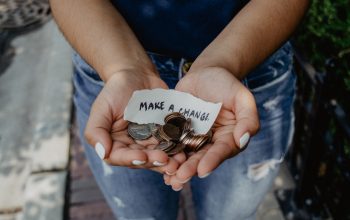The psychological effects of debt aren't just felt by those who hold the debt, they're often also felt by those...
Debt isn’t normally something that happens overnight. It’s often something that’s built up over time and a problem that can sneak up on many individuals who struggle to keep track of their day to day finances.
While most people become aware of a growing problem long before it becomes a crisis, many wait to take action until they become insolvent and the situation forces them to deal with the problem. As much as debt can be built up over time, it can also be dealt with over time. Where bad habits and small mistakes have added up, replacing these with good habits and small economies can result in the accumulated debt being reduced and eventually eliminated without having to resort to more formal and more extreme methods of dealing with problem debt.
Assess Your Debts to Get Out Of Debt
In order to put a plan in place, you must first find out where you are. Draw up a monthly or weekly (whichever is more appropriate) cashflow and see whether you typically spend more than you earn. If you find that you’re committed to spending more than you earn, then something needs to change immediately or debt is more or less inevitable. The only way to do this is to increase your income, reduce your outgoings, or both.
Reduce Your Outgoings – Small Economies Add Up
While increasing your income isn’t usually something you can simply just decide to do, reducing your outgoings is almost always achievable. Firstly take a look at your unnecessary extravagances.
- Did you sign up for the gym, never go, but continue paying just in case you might decide to go back? If you’re not locked into a contract, cancel the membership. There are plenty of pay as you go gyms to go to if you decide to take it back up again.
- How long is it since you last compared your utility bills? Water, gas, electricity, phone, broadband, insurance etc are those necessary expenses which it’s easy to just sign up for and forget about. But customers who stick with the same suppliers tend to get worse deals than those who regularly switch. Getting online and comparing can often reduce your monthly outgoings significantly.
- Keeping a track of ‘treats’ might leave you surprised at how much you’re spending. For example, if you regularly grab a coffee at lunch from one of a number of well know chains, that’s £3-5 easily. £3 spent Monday to Friday, is £15 a week, which over 50 weeks becomes £750 a year. Could you buy a bag of ground and a cafetiere instead?
These are just a few examples, but analysing where your money is going and trimming the unnecessary expenses can add up to quite a large saving over time, which can enable you to bring your spending back down to being within your means and hopefully leave you with a surplus.
Get Out Of Debt By Paying Down Your Debts
One of the easiest ways to get into perpetual debt is borrowing to pay off existing debt. Essentially, debt is being maintained rather than paid off. What you owe is just being moved around rather than reduced. It’s easy to lose track and easy to end up worse off as such transfers are rarely free and payments made simply cover interest.
Making a firm commitment to reduce the overall debt balance once you’ve got your expenses under control will pay dividends. Any surplus you have after expenses have been taken into account should be put towards paying off debt faster rather than considered extra ‘spending money’.
Firstly, pay attention to your most expensive debt, the store cards and credit cards. Those which have the highest interest rates should be reduced first. High interest rates mean that you’re paying just for the privilege of having debt without necessarily reducing it. Remember that making only the minimum repayment on a credit card is likely to mean that your debt is barely reduced as most of it will go on interest.
Getting rid of your most expensive debt will quickly see you paying less out each month These savings can then be applied to your next most expensive debts and so on.
Get Help to Get Out of Debt
At Lines Henry, as licensed Insolvency Practitioners, we have decades of experience of helping individuals and businesses deal with problem debt and insolvency. Caught early enough, a debt problem doesn’t have to be a crisis and we offer a free consultation to those looking for advice about getting back on the financial straight and narrow.
Contact us for a consultation and see what we can do help with your problem debt before it becomes worse and needs more formal methods to tackle.
Speak to Us, We Can Help.



